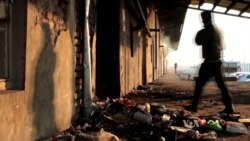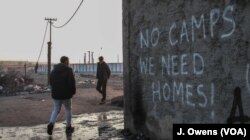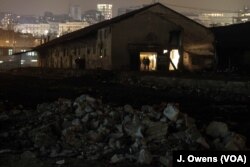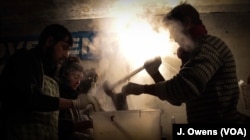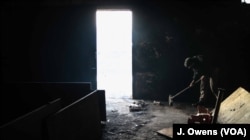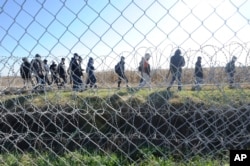There is sunshine outside, but in Belgrade’s crumbling barracks, the darkness is broken only by the dim flicker of fires, around which huddle groups of refugees desperate to leave Serbia.
Many have left this smoke-filled, decrepit shell in recent weeks and gone to an official camp specifically opened to accommodate them.
However, of the hundreds of refugees who have chosen to remain, some calculate that the poor conditions are worth enduring.
"This is a very difficult life, a very dirty life," explained 16-year-old Afghan Said Abid, who fled his home seven months ago because of threats from the Taliban against his family.
“I’ve never seen this kind of place before. It’s a place for animals, and now I am sleeping here,” he said.
Conditions are grim, and rats can be heard rustling amid piles of rubbish, while temperatures plunge to sub-zero as night approaches.
Last month, the building was filled with acrid, poisonous smoke from the burning of treated railway timbers as people fought to keep warm amid heavy snowfall.
The situation drew the attention of international media, and prompted the opening of a camp a month ago specifically created for those living in the barracks.
Humanitarian gesture
"Our goal was to move them away, and to accommodate them into some official asylum centers,” explained Ivan Miskovic, who works for the government’s Commissariat for Refugees and Migration. He called the move a “humanitarian gesture."
The latest camp, one of 17 in Serbia, was opened with a focus on taking in the largely male population around the barracks.
Reports from the camp are mixed. There are unverified claims of a refugee being assaulted by a staff member, something the Commissariat for Refugees and Migration said it had not received reports about.
Others praised the facility. Among satisfied residents are 18-year-old Pakistani Qaisar Ahmed, who told VOA, "... at the camp there’s new beds, new blankets, and they provide us food. It’s very good and I feel better there."
Staying off-radar
A clean bed and blankets are exactly what Abdul akbar Safi, an Afghan who once worked for NATO and now lives in the barracks, would like.
For some, access to the camps is a question of numbers. There are about 6,000 spaces in official camps for the 7,500-plus refugees in the country.
For others, though, staying away is a matter of choice. Like many sleeping in rough conditions and remaining off-radar across Serbia, Safi's decision to remain in the barracks is driven by the desire to find his way into the European Union. He feels that is hindered, not helped, by engaging with the state and following official procedures.
Safi is effusive in his praise for his treatment in Serbia, but his experience of crossing through Iran, Turkey and Bulgaria has left him with a deep mistrust of official camps.
"You cannot imagine life here," he said, "but I don’t go to the camp as maybe one day the camp will be closed."
Rumors of camps suddenly becoming "closed" before refugees are deported back to the countries they passed through to get to Serbia are common, though unverified, and they are vigorously denied by the commissariat’s Miskovic.
Unwilling to wait
Safi also figures the barracks are his best shot at connecting with smugglers and making it into EU member Hungary, which he sees as a gateway into western Europe.
He has made three attempts, and claims one friend has tried and failed 29 times.
Safi has given up on the official procedure passing legally onward, which includes waiting to move up an official waiting list likely to favor families and the most vulnerable.
The number of refugees has grown since Croatia closed its border and neighboring Hungary tightened its border, only allowing about 10 refugees daily to cross.
According to Nuno Felicia, who works in the barracks with volunteer group Holes in the Borders, many refugees “have their bags prepared at any time” to leave.
"They want to go to the border, and be free at any time if a smuggler calls them to cross the border," he added.
Never giving up
Soon refugees may not have the choice of whether to endure the barracks' miserable conditions while they prepare to move on.
The threat of the barracks’ demolition remains, as they stand on ground set to be part of the Belgrade Waterfront project, a major luxury development.
But Safi claims he wants to keep out of the camps.
"Maybe I will find somewhere near this place, maybe I will live in a park. One day, when I am lucky, I will cross the border," he added.
"I will never give up."




